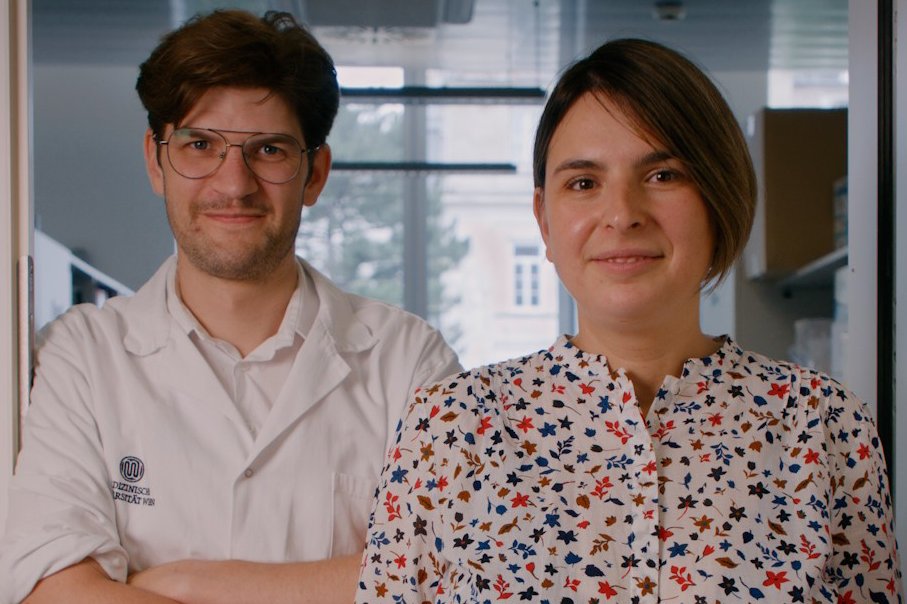After activation, data will be sent to YouTube. Further information here: Data protection
English subtitles on Youtube available: click on the gear icon and select “Untertitel” – “Englisch”
Dr. Christoph Kornauth and Dr. Tea Pemovska, PhD

MedUni Wien RESEARCHER OF THE MONTH September 2022
Patients with advanced, aggressive hematological cancer, such as leukemia and lymphoma, frequently respond poorly to standard therapy and experience short survival. In the current study, we explored whether therapy selection based on results from a functional test is clinically possible and effective in patients with recurrent hematologic cancer. In a multidisciplinary, collaborative project, physicians and scientists led by Prof. Philipp Staber (Division of Hematology and Hemostaseology, MUW), Prof. Ingrid Simonitsch-Klupp (Institute for Pathology, MUW), Prof. Giulio Superti-Furga (scientific director of CeMM), and Prof. Berend Snijder (ETH Zurich, formerly CeMM) developed a single-cell functional precision medicine (scFPM) platform to functionally characterize individual cells ex vivo by measuring cancer-specific responses to hundreds of small molecules in real-time patients’ liquid biopsies collected from individual patients. Personalized treatments could be provided to a large proportion of study patients (39%; 56/143) and 54% of these treated patients had a significant, at least more than 30% prolonged time of progression-free survival under the scFPM- guided therapy. 21% of all patients even showed a long-term response. Thus, this study demonstrates that individual therapy tailoring is feasible, and effective in breaking resistance to prior therapies.
Selected Literature
- Kornauth C, Pemovska T, Vladimer GI, Bayer G, Bergmann M, Eder S, et al. Functional Precision Medicine Provides Clinical Benefit in Advanced Aggressive Hematological Cancers and Identifies Exceptional Responders. Cancer Discov. 12(2):372-387 (2022).
- Snijder B, Vladimer GI, Krall N, Miura K, Schmolke AS, Kornauth C, et al. Image-based ex-vivo drug screening for patients with aggressive haematological malignancies: interim results from a single-arm, open-label, pilot study. Lancet Haematol. 4(12):e595-e606 (2017).
- Vladimer GI, Snijder B, Krall N, Bigenzahn JW, Huber KVM, Lardeau CH, et al. Global survey of the immunomodulatory potential of common drugs. Nat Chem Biol. 13(6):681-690 (2017).
- Tourneau CL, Delord JP, Gonçalves A, Gavoille C, Dubot C, Isambert N, et al. Molecularly targeted therapy based on tumour molecular profiling versus conventional therapy for advanced cancer (SHIVA): a multicentre, open-label, proof-of-concept, randomised, controlled phase 2 trial. Lancet Oncol. 16(13):1324-34 (2015).
- Dienstmann R, Jang IS, Bot B, Friend S, Guinney J. Database of Genomic Biomarkers for Cancer Drugs and Clinical Targetability in Solid Tumors. Cancer Discov. 5(2):118-23 (2015).
- Pishvaian MJ, Blais EM, Brody JR, Lyons E, DeArbeloa P, Hendifar A, et al. Overall survival in patients with pancreatic cancer receiving matched therapies following molecular profiling: a retrospective analysis of the Know Your Tumor registry trial. Lancet Oncol. 21(4):508-518 (2020).
- Prasad V. Perspective: The precision-oncology illusion. Nature. 537(7619):S63 (2016).